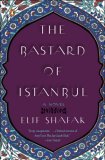Book Club Discussion Questions
In a book club? Subscribe to our Book Club Newsletter and get our best book club books of 2025!
For supplemental discussion material see our Beyond the Book article, Turkey, The Ottoman Empire, and the Armenian Genocide. and our BookBrowse Review of The Bastard of Istanbul.
Please be aware that this discussion guide will contain spoilers!
Discussion Questions
- On page 34, to whom, and for what, is Zeliha apologizing?
- The women of this novel create many rules for themselves. Identify and list them, discussing the circumstances that each reflects.
- How do the various characters in the novel express their femininity or womanhood? How do both the religious conservatism and the secularity of Istanbul influence them?
- Asya wants so much to be different from her mother. Yet she is like her in so many ways. Compare and contrast Zeliha and Asya.
- On page 135, Auntie Cevriye says, “The problem with us Turks is that we are constantly being misinterpreted and misunderstood.” Share your idea of what it must be like to live in Turkey. Has this book changed or reinforced your opinion?
- Born on different continents and raised in different ethnic traditions, what do Asya and Armanoush have in common? How are they different?
- Asya and Armanoush both find themselves in families that encourage conformity and dislike “standing out,” despite the fact that both families love their black sheep regardless. Explain the reasons each family feels this way and cite examples of how each acts out its preference.
- Everywhere in this story are symbols of contradiction—or, more specifically, the concept of being many different things at once, existing in a state between belonging and separateness. Find some examples of this theme throughout the novel.
- On pages 179–180, Asya and Armanoush discuss their differing opinions on the role of remembrance and the past. With whom do you most agree and why?
- Zeliha refuses to tattoo her lover, Aram, with his chosen design: an upside down tree with its roots in the air. What does it mean to be displaced but not placeless? How does this concept apply to the characters of the novel?
- Istanbul is personified in many different ways throughout the novel. It also serves as a symbol with many layers of meaning. While sharing drinks and dinner with Aram, Zeliha, and Asya, what is it that Armanoush comes to understand about Istanbul and its hold over Armenians and Turks alike? What significance does this portrayal of the city have for the novel and its characters?
- With the weight of the truth on her shoulders, Auntie Banu wonders if it’s better for human beings to endlessly pine to discover their history or to know as little of the past as possible and forget what small amount is remembered. What do you think?
- What is the significance of naming each chapter after an ingredient of the dessert ashure?
Unless otherwise stated, this discussion guide is reprinted with the permission of Penguin.
Any page references refer to a USA edition of the book, usually the trade paperback version, and may vary in other editions.
